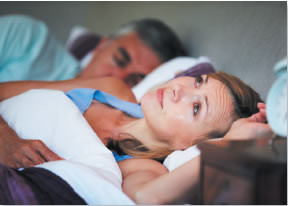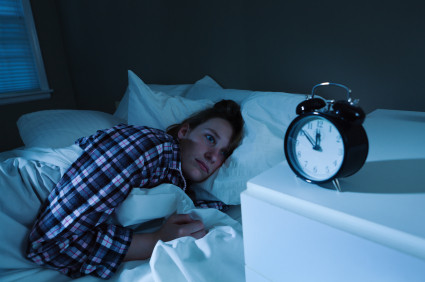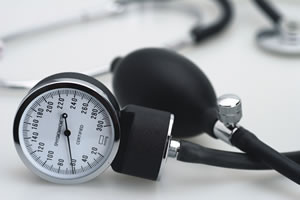
What are somatic workouts?

How to curb your stress eating

How to spot Parkinson’s disease symptoms

8 simple ways to reduce ultra-processed foods in your diet

Heart failure symptoms in women: How they’re different

GERD diet: Foods to avoid to reduce acid reflux

Strong is the new skinny

Everyday habits that sneakily weaken your bones

Don’t wait to get help for back pain

Correcting how you walk may ease osteoarthritis knee pain
Sleep Archive
Articles
Too little — or too much — sleep linked to dementia risk
Participants in the Women's Health Initiative Memory Study (WHIMS) have provided a trove of information. They completed monthly questionnaires and underwent cognitive tests. Those who showed significant decline were also tested for dementia.
Recently, researchers analyzed data from 7,444 participants over 65. They had followed the women an average of seven years. Their report was published online June 15, 2015, by Alzheimer's & Dementia.
Restructure your day to get a better night's sleep
Consistency in your schedule may help restore patterns of sleep and waking so you can get needed rest.
Image: Thinkstock
Wake up at the same time every day. Waking time is the anchor for your circadian sleep rhythm.
The free time that accompanies your older years may allow you to keep any schedule you like: sleep late one day or wake up early the next. But that lack of structure can have a negative impact on your sleep. “I see a fair number of people who say their sleep was better when they were working, but after retirement it becomes more disrupted,” says sleep specialist Dr. Cynthia Dorsey, assistant professor of psychology in Harvard Medical School’s psychiatry department.
Snoring solutions
Simple changes can help to turn down the volume.
If your wife or sleep partner often seems bleary-eyed and resentful in the morning, you may be one of the millions of adults who snore habitually—a condition that affects twice as many men as women. Snoring occurs when your upper airways narrow too much, causing turbulent airflow. This, in turn, makes the surrounding tissues vibrate, producing noise.
"Snoring is a sign that there is a really narrowed space," says Dr. Sanjay Patel, a sleep disorder specialist at Harvard-affiliated Beth Israel Deaconess Medical Center. "That happens either in your nasal passages or in the back of your throat." Some men are snorers because they have excess throat and nasal tissue. Others have floppy tissue that's more likely to vibrate. The tongue can also get in the way of smooth breathing.
A pill-free way to fight insomnia
It appears that cognitive behavior therapy may help people with chronic insomnia and no underlying medical problems fall asleep faster.
Insomnia therapy helps reduce knee pain
Painful knees and sleeplessness often go hand in hand, but a form of counseling called cognitive behavioral therapy (CBT) can help with both problems, according to a study in Arthritis and Rheumatology.
The study involved 100 people ages 50 to 70 with wear-and-tear arthritis (osteoarthritis) in the knee as well as insomnia. They were chosen at random for either eight sessions of CBT or a comparison treatment, called desensitization therapy, known not to be very effective for insomnia.
How a sleep shortfall can stress your heart
Getting less than six hours of sleep on a regular basis can boost levels of stress hormones, which can strain your cardiovascular system. |
Find out if your sleeping habits put you at risk—and what to do about it.
Treating sleep apnea may stave off cognitive decline
Heavy snoring and sleep apnea may be linked to early declines in memory and thinking, according to a new study published online April 15, 2015, by the journal Neurology. The research also suggests that treating sleep apnea with a continuous positive airway pressure (CPAP) machine may delay the declines.
For the study, researchers reviewed the medical histories for 2,470 people ages 55 to 90 and categorized them as free of memory and thinking problems, in early stages of mild cognitive impairment, or with Alzheimer's disease. For each category, the researchers compared people without sleep apnea, people with untreated sleep apnea, and people with sleep apnea who had used CPAP machines to aid breathing as they slept.
Sleep breathing problems may hasten decline in thinking skills
As we reported in March, sleep apnea and other sleep breathing problems are associated with the development of dementia. Now a study published online April 15, 2015, by Neurology finds that sleep breathing problems are associated with an earlier onset of the decline in thinking skills.
Researchers analyzed the medical histories of about 2,500 people ages 55 to 90 and found that people with sleep breathing problems were diagnosed with mild cognitive impairment (a decline in thinking skills) an average of 10 years earlier than people who didn't have those problems. The encouraging news: people who treated their sleep breathing problems with a continuous positive airway pressure (CPAP) machine were diagnosed with mild cognitive impairment about 10 years later than people whose problems were not treated. The study doesn't prove a cause-and-effect relationship, but it does offer hope. "CPAP improves the quality of sleep in people with sleep-disordered breathing. Healthy sleep is an important time for our brains to accomplish critical 'housekeeping' tasks. One of these tasks is clearing beta-amyloid, one of the main proteins associated with Alzheimer's disease," says Dr. Scott McGinnis, an instructor in neurology at Harvard Medical School.
Cognitive behavioral therapy offers a drug-free method for managing insomnia
Many people with insomnia turn to sleeping pills, which often have unwanted side effects. Few of them know about an equally effective therapy that targets the root cause of insomnia without medications. Called cognitive behavioral therapy for insomnia, or CBT-i, this short-term talk therapy teaches people to change the unproductive thinking patterns and habits that get in the way of a good night’s sleep. While this therapy can’t “cure” insomnia, it does provide tools to better manage it. In a review article in this week’s Annals of Internal Medicine, researchers found that people treated with CBT-i fell asleep almost 20 minutes faster and spent 30 fewer minutes awake during the night compared with people who didn’t undergo CBT-i. These improvements are as good as, or better than, those seen in people who take prescription sleep medications such as zolpidem (Ambien) and eszopiclone (Lunesta). And unlike medications, the effects of CBT-i last even after the therapy ends.
Trouble falling asleep linked to high blood pressure
High blood pressure is one of the many health risks associated with not getting enough sleep, which is often caused by insomnia, or difficulty falling or staying asleep. Although often considered a nighttime problem, some people with insomnia may be in a state of "hyperarousal" that also makes it hard for them to nod off during the day. Now, new research suggests that people with chronic insomnia who also have trouble napping face a higher risk of high blood pressure.
The study, in the March 2015 issue of Hypertension, included more than 200 people with chronic insomnia (defined as insomnia that lasts more than six months) and almost 100 normal sleepers. All underwent daytime nap tests, which measures how quickly a person falls asleep in a quiet environment during the day. People with chronic insomnia who took longer than 14 minutes to fall asleep during the nap studies had three times the risk of high blood pressure compared with normal sleepers, the researchers found. Treatments such as medications and biofeedback to help dampen hyperarousal may be best for people with this type of insomnia, they suggest, although more research is needed.

What are somatic workouts?

How to curb your stress eating

How to spot Parkinson’s disease symptoms

8 simple ways to reduce ultra-processed foods in your diet

Heart failure symptoms in women: How they’re different

GERD diet: Foods to avoid to reduce acid reflux

Strong is the new skinny

Everyday habits that sneakily weaken your bones

Don’t wait to get help for back pain

Correcting how you walk may ease osteoarthritis knee pain
Free Healthbeat Signup
Get the latest in health news delivered to your inbox!
Sign Up










